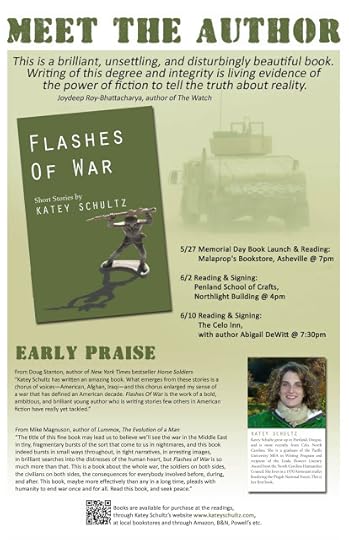Katey Schultz's Blog, page 26
June 12, 2013
Summer Reading
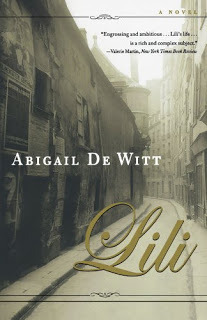
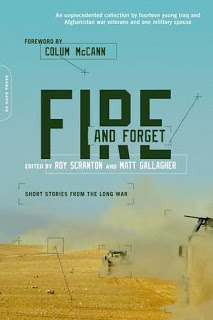
When started to pack for 8 weeks in Interlochen, Michigan and its surrounding cities, the first thing I reached for was my books. I'm taking far more than I can finish in two months, but still, I can't part with any of them.
Some books I'm bringing to get autographed (James Arthur's Charms Against Lightning and Louise Hawes' Black Pearls and Rosey in the Present Tense), even though I've already finished reading them. Other books I'm bringing because I hope to run into the authors this summer around Interlochen Center for the Arts or my regional travels (Doug Stanton's Horse Soldiers, Benjamin Busch's Dust to Dust, Molly Atwell's Wild Girls). I've read these as well, but I want to brush up on a chapter or two before hanging out with the authors again.
Other books fall into the "war research" category, including: The Accidental Guerrilla, Fire & Forget, In the Graveyard of Empires, In My Father's Country, and The Places In Between. I need these for reference and will read some of them in full, while others have specific chapters that I rely on as resources.
Then there's the teaching books--those books I can't stand to part with anytime I travel as an instructor. I'll be Artistic Director of the Interlochen College Writer's Retreat for Week 1. Weeks 2-7 I'll be Creative Writing Faculty for Interlochen Summer Arts Camp (teens). And Week 8 I'll be Faculty for the College's week-long residential Memoir course. During these courses, I constantly refer to The Truth of the Matter, The Field Guide to Flash Nonfiction, The Field Guide to Flash Fiction, Writing the Memoir, and various anthologies of nonfiction and fiction teaching texts.
Finally, there's the I CAN'T WAIT books--those that, if I didn't have to research war and if I didn't have to teach and if I wasn't responsible for introducing authors or mingling with them at events, I'd get my paws on first and foremost. These include: Just Kids by Patti Smith, The Language of Men by Anthony D'Aires, North of Hope by Shannon Huffman Polson, Lili by Abigail DeWitt, The Book of Men by Dorianne Laux, and more. These are my "goodies" pile that I pull from with delight and awe, savoring each page. The others matter too, of course, but my relationship with those books is different because I'm "using" them for an express purpose right out of the gate. But my CAN'T WAIT books...the only purpose in my relationship to them is good ol' fashioned storytelling. I relish the chance to dive in.
Published on June 12, 2013 20:13
June 10, 2013
And, We're Off!
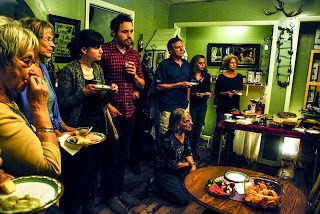 This weekend I got my first real taste of "book tour living." The whirlwind kicked off with a fundraiser for Carolina Mountains Literary Festival in Burnsville. This event included ticketed-entry for wine tasting and light snacks, and I was happily surprised when a crowd of thirty filled the tiny Burnsville Wine store just a few minutes after event kickoff. Asheville authors Dale Neal and Katherine Soniat read from there work, Charles Price came from the Pensacola side of the mountains, and Abigail DeWitt and myself represented the South Toe Valley. We read for 5 minutes roughly every half hour, and folks mingled and shopped and drank between events. The evening also included beer and brats on the patio!
This weekend I got my first real taste of "book tour living." The whirlwind kicked off with a fundraiser for Carolina Mountains Literary Festival in Burnsville. This event included ticketed-entry for wine tasting and light snacks, and I was happily surprised when a crowd of thirty filled the tiny Burnsville Wine store just a few minutes after event kickoff. Asheville authors Dale Neal and Katherine Soniat read from there work, Charles Price came from the Pensacola side of the mountains, and Abigail DeWitt and myself represented the South Toe Valley. We read for 5 minutes roughly every half hour, and folks mingled and shopped and drank between events. The evening also included beer and brats on the patio!Less than 12 hours later, my mom and I hit the road for a there-and-back trip to Chapel Hill, where I got to read at the one-and-only Flyleaf Books. Apparently there are
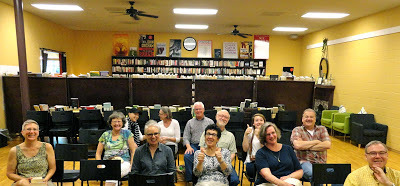
At the Flyleaf event, which was partitioned from the main part of the bookstore and included THE BEST MIC I've ever used and a lovely podium, I also got to read with author Peter Makuck. It was interesting to experience reading in a city that I don't know with another author whose work I had never read. I studied up beforehand -- learning he was a Professor Emeritus at UNC Wilmington, that he had read several times at Flyleaf before, and that he had books in both poetry and fiction under his belt--but I hadn't found time to read any of his books yet (I only had a few weeks notice!). Peter and I talked for a few minutes before meeting the audience, the bookstore owner introduced us, and we were off and running. Will it always run this smoothly? Who knows. I had a blast! And Peter's reading was humorous, delightful, and uplifting. Check him out here.
Come Sunday, it was time to catch up on life (just barely) by running all manner of errands in Asheville as I prepare to leave this Friday for Michigan, two weddings, and the rest of the book tour. Boring but important, these things needed attending: new socks, a strapless bra for the dress I have to wear in the wedding I'm in, specialty foods (I have allergies) that I can't get in Michigan, and purchasing locally made ceramic art as wedding gifts. It's the little things we run out of time for, folks, and Sunday was my last day to pull it all together. I ran errands for 12 hours, came home to a rain storm and a new leak in the Airstream, and went to sleep.
Tonight, I read with author Abigail DeWitt (two writers in the same valley writing about war!) at The Celo Inn at 7:30pm. You can't get much more "hometown" than the Inn that's 2 miles from my Airstream, and a venue where most audience members will probably walk to the event down a gravel country road they can find their way home on through the dark. I'm looking forward to a strong send off, and although I've said it before, these local readings make me feel SO GRATEFUL for our community here. Being surrounded by so many self-employed studio artists and self-made small business owners, I feel people really "get it" here. This is hard work. They know hard work. And as I've rooted for them over the years, they're rooting for me. I couldn't feel more blessed by them. What a wild ride this is!
New: The reviews page has been updated. Flashes of War is getting nods left, right, and center. Check it out here!
Published on June 10, 2013 05:00
June 6, 2013
Special Feature: Interview with Author Helen Benedict
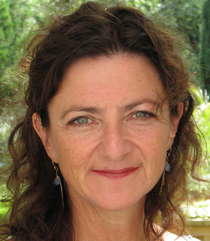 When I was writing Flashes of War, I didn't read any fiction about Iraq and Afghanistan. But I immersed myself fully in many skillfully researched nonfiction books about war, the military, and the Middle East. It was during this time that I came across the work of author Helen Benedict and first read her essays, The Lonely Soldier. Later, I learned that she had also written Sand Queen, another "war" book--only this one was fiction. Intrigued, I reached out to her online and was honored and pleased to get a response. Today, I'm happy to share this brief interview with Helen Benedict on The Writing Life blog. Enjoy--and thanks, Helen, for the incredible writing you've shared and the positive changes that have happened as a result of your work.
When I was writing Flashes of War, I didn't read any fiction about Iraq and Afghanistan. But I immersed myself fully in many skillfully researched nonfiction books about war, the military, and the Middle East. It was during this time that I came across the work of author Helen Benedict and first read her essays, The Lonely Soldier. Later, I learned that she had also written Sand Queen, another "war" book--only this one was fiction. Intrigued, I reached out to her online and was honored and pleased to get a response. Today, I'm happy to share this brief interview with Helen Benedict on The Writing Life blog. Enjoy--and thanks, Helen, for the incredible writing you've shared and the positive changes that have happened as a result of your work.From Helen's website: Helen Benedict is the author of six novels and five books of nonfiction. Her latest novel, SAND QUEEN, set in the Iraq War, is now out in paperback from Soho Press. Culled from real life stories of female soldiers and Iraqis, SAND QUEEN offers a story of love, courage and struggle from the rare perspective of two young women on opposite sides of a war. Helen Benedict's books, SAND QUEEN, and THE LONELY SOLDIER, along with her articles about the sexual assault of women in the military, inspired the award-winning documentary, The Invisible War, shown to acclaim at Sundance, 2012. Benedict's work also inspired a landmark law suit against the Pentagon on behalf of victims of military sexual assault, and won the 2010 EMMA award from the National Political Caucus, the Ken Book Award, and the James Aronson Award for Social Justice Journalism.
Katey Schultz: You've explored the topic of women in the military through fiction and nonfiction. As you were writing the novel Sand Queen, in what ways did you feel limited or freed up by the genre? Likewise in nonfiction, as you wrote The Lonely Soldier, where did the genre itself limit and free what you ultimately chose to publish?
Helen Benedict: I can best answer this by discussing both books at once because my decision to write the novel, Sand Queen, really came out of certain limits I found while researching and writing my nonfiction book, The Lonely Soldier. While doing research, I listened to the women in my book for many, many hours over many, many months, and did my best to render their stories as true to the way they told them as I could. But often, as they talked, they would hit a wall and fall silent, either unable or unwilling to enter certain traumatic memories of war, remorse, betrayal or loss. I came to feel that it was in those very silences that the true story of war lay--the inner experience of it as felt by these women soldiers. And that inner experience --that field of silence--is exactly where fiction belongs. So I wrote Sand Queen as a way of penetrating the experiences of war more deeply than I could in nonfiction.
KS: I imagine that fictionalizing real events is not as easy as it sounds, because there must be a constant push/pull between the true, lived experience and the fictional, created experience. What advice do you have for authors trying to fictionalize real events? In particular, how can writers achieve that feeling of organically imagining new, surprising details (where our best writing often takes place) when they already know what actually happened?
HB: I think that if an author tries to stay too close to real events when writing fiction, the facts might indeed weigh down and limit the imagination. Sand Queen is not based on any real person or series of events. Sometimes an anecdote or event I had heard from a soldier would flow into the story naturally, but I purposely avoided trying to model the novel on any actual person's story. For that reason, I find it's better to fact check after the first draft. Leave your imagination unfettered. Then check for accuracy and plausibility later, and change accordingly.
KS: Were there any cultural, legislative, or personal positive changes made as a result of writing and publishing The Lonely Soldier or Sand Queen?
HB: Yes, I am pleased to say. My books and articles on women soldiers, and especially on the sexual assault of military women by their so-called comrades, inspired a landmark class action suit against the Pentagon on behalf of service members who have been sexually attacked while serving. My work also inspired the documentary, The Invisible War. That film was nominated for an Oscar and has been watched on Capitol Hill and by the military's top brass, leading to ongoing changes in the law. The film is now watched by incoming Marines and others in the military too, as part of basic training. I get letters from veterans almost every week saying how alone they felt until they read my book or saw that film, which is one of the most rewarding things that's ever happened to me. It's important to say, though, that the people with true courage here are the women and men speaking out about assault in the military...that takes guts, and my books could not have existed without them. They're the ones truly making the military change.
KS: What are you writing and reading these days and what do you enjoy most about each?
HB: I am writing a novel about the relationship between Iraqi refugees and American soldiers, and reading all sorts of things, from Joan Silber's new story collection, Fools, to the new novel by Khaled Hosseini, the author of The Kite Runner and the wonderful book about women in Afghanistan, A Thousand Splendid Suns. His new one is And The Mountains Echoed. One day, I will move on from reading and writing about war. I think. But the subject is addictive not so much because war brings out the worst of what we humans do, but because it has brought me face to face with some of the most generous and noble people I have ever met. What do I enjoy most about each? All I can say to that is I cannot imagine being able to live without reading or writing. They are as essential as oxygen.
Learn more about Helen Benedict and her work here.
Published on June 06, 2013 05:00
June 3, 2013
Book Tour: Spilling My Guts
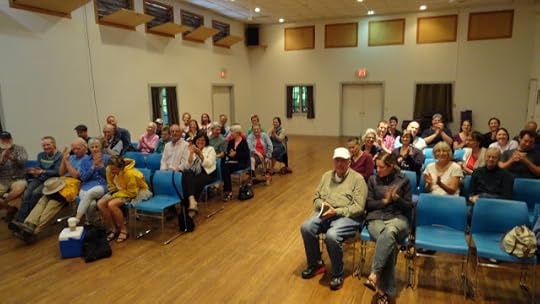 It's dawning on me how difficult this is going to be. With two hometown readings complete and one to go, I'd be lying if I didn't tell you that I fear "it's all downhill from here." I know I am a public optimist. I know I'm running a business here. But I also make a point to share, within professional reason, the highs and lows of the writing life with my readership. The highs of last week are obvious--a standing ovation at Malaprop's, a few more good reviews, and a crowd of 45 yesterday at Penland School.
It's dawning on me how difficult this is going to be. With two hometown readings complete and one to go, I'd be lying if I didn't tell you that I fear "it's all downhill from here." I know I am a public optimist. I know I'm running a business here. But I also make a point to share, within professional reason, the highs and lows of the writing life with my readership. The highs of last week are obvious--a standing ovation at Malaprop's, a few more good reviews, and a crowd of 45 yesterday at Penland School.The low hasn't happened yet, but in my mind it's playing over and over. Here's what I dwell on: I'm told that I will be reading to audiences of 2 to 5 people. If I'm lucky, maybe 10. Apparently no matter who you are or "how good," this happens to many writers and public readings during summertime are an especially hard sell in northern states (where I'm headed). I'm also told that an author can expect to sell a book to 10-20% of its audience of strangers. So these hometown readings--where I'm selling to 50% of the crowd are unique. If you put these two facts together, in the coming months I could be facing hours-long drives with 4 people in an audience and 2 book sales. Two book sales through a bookstore equals $2 profit for me. (Through my website, it would be $14 profit, but the trade off would be that the tally doesn't go toward NY Times lists and the purchase doesn't create demand through a public venue.) So here's where the other part I've been told about comes in: I will not make any money selling books.
But let's go back to that public optimism thing, because
I've cast aside reason before: when I got in my car for a three-year journey; when I borrowed $55,000 for my MFA; when I skydived junior year of college; when I backpacked solo for a week at the age of 17; when I decided to write about war even though I'd never seen one…and most recently…when I hired a publicist and a book tour manager on my own dime ($7K, or roughly 35% of my annual income) and promised myself and the publisher that I'd do everything within my power to sell 5,000 books over the next 3 years.
5,000 books, friends. My publicist and my publisher both raised their eyebrows at that. Not because they'd object to it, not at all. But because it's ambitious, I suppose, and perhaps also somewhat deluded. But I heard a talk a long time ago about how 5,000 is the baseline to make your mark and I'm aiming for it. As with chapbooks in poetry, where 500 copies sold is sufficient, for an independent university press that does no PR, 5,000 is going to be the buzz number. And as someone who wants to ultimately teach in low-res MFA programs, having 1 book is only half the hurdle. The other half is making sure that dang book reviews well and sells.
I always been a little ahead of myself. I send out work too early, before it's ready. I can see the finish line months, sometimes years in advance, and I grow impatient. I might have the right finish for me in mind, but I'm not always going to get there the way I think I will. This is a flaw that has probably helped me get this far, but it's also made some moments of my life excruciating. I wish I could time travel to three years from now, or to my first (fingers crossed) big advance on a novel from a publishing house in New York. What would that writer say to me, this writer, today? Would that writer say, "You couldn't have gotten this book advance [or low-res teaching job] if you hadn't pushed so damn hard with Flashes of War. Good job. All your work paid off." Or would that writer say, "If only you'd been able to relax and enjoy your first book tour more, you would have seen that you were headed here--to this book advance [or low-res teaching job]--all along, no matter what. Try not to worry as much this time around."
But I know two things for sure: One, there is no justice in writing or in the publishing industry. The person who tries hardest does not always win. The person who sacrifices more does not necessarily gain it back, or gain more, in the end. And two, I know for certain that I'm never going to give up. Even if NYC burns down and all the publishing houses I ever dreamed of burn with it, I won't stop. Somewhere out there the possibility exists that I can continue to make my living as a writer and advance my career from year-to-year. It's just that right now, I can't see how it's going to manifest.
What I can see, however, are the shining faces from my reading at Penland School of Crafts, featured at the top of this post. And I can see the woman, Carol--was it?--who bought my book, introduced herself, and said, "I've always admired what you do. I think what you do is incredible." I didn't know who she was, and if I could have stayed forever in that moment, I would have (Ok, actually, that'd get kinda weird but you know what I mean). Thank you, dear friends, for being there (and here, reading my blog). I'll carry your smiles with me across the miles.
Published on June 03, 2013 05:00
May 30, 2013
Malaprop's Book Launch
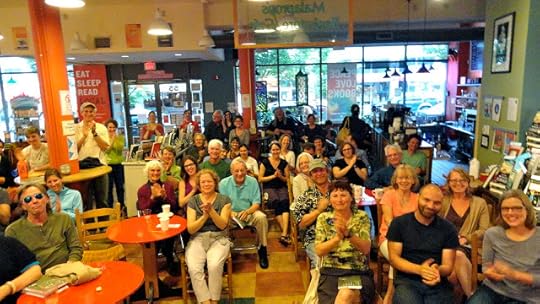 Flashes of War is officially launched and I know now that there is nothing better than a home town audience. These 45+ smiling faces belong to people I know and love…many of whom had never heard any of my stories before, but who believed in my work as a writer all the same. When I came down the hallway after my introduction at Malaprop's and was greeted by such warmth and applause, I nearly broke down. People here care about what I'm doing. In a community of so many self-supporting studio artists (I count 17 of them in this photo alone), I have never had to face the questions: What do you mean you're writing a book? A book about war? And trying to make a living? That's not a gift you can put a price tag on. It's authentic and irreplaceable and, on Monday night, I felt that more than any other time in my 11 of years of Western North Carolina living.
Flashes of War is officially launched and I know now that there is nothing better than a home town audience. These 45+ smiling faces belong to people I know and love…many of whom had never heard any of my stories before, but who believed in my work as a writer all the same. When I came down the hallway after my introduction at Malaprop's and was greeted by such warmth and applause, I nearly broke down. People here care about what I'm doing. In a community of so many self-supporting studio artists (I count 17 of them in this photo alone), I have never had to face the questions: What do you mean you're writing a book? A book about war? And trying to make a living? That's not a gift you can put a price tag on. It's authentic and irreplaceable and, on Monday night, I felt that more than any other time in my 11 of years of Western North Carolina living.The other good thing about starting the book tour "around home" is that there are a few more local events to look forward to, where I hope my stories can reach even more folks I know and love (and of course, some strangers and "new fans," too!). I'll be reading at Penland School in the Northlight Building this Sunday 6/2 at 4pm, as well as The Celo Inn next Monday 6/10 at 7:30pm. I can't imagine a more uplifting send off. [Secret for local readers: I'm featuring "Home on Leave" at Penland and "The Ghost of Sanchez" at The Celo Inn. You choose--do you want a young man grappling with what it means to be a warrior (bonus: sex scene), or a skilled soldier who can't let go of the ghost of his friend (bonus: deep symbolism).]
It feels very rewarding to have come this far, but I have 14 more events in the next 15 weeks--everything from fundraisers to dual-author readings to faculty presentations--so I know I need to pace myself. June 21st will be Buy Day for Flashes of War, and if you're on my email list you'll receive a note about that. But other than that, the bulk of the email/marketing campaign is done. Now I just have to hope that the book sales match the enthusiasm of the reviews. Anything you can do to recommend this book to people you think would enjoy it, will make a difference. And any purchases you can make as gifts for friends, or organized for a book club, will support me tenfold (actually, sevenfold--that's $7 per book sale through my website, and about $1 per book sale through anywhere else).
And so to you, dear readers of The Writing Life, a very heartfelt thank you as well. Since June 29th, 2005 strangers near and far have checked back to this site again and again and followed my story, chasing down the dream of The Writing Life. Little did you know that you, as audience members and readers and book buyers and link sharers alike, were so much a part of that dream as well. I couldn't be here without you! Three cheers for each and every one of you!
Published on May 30, 2013 05:00
May 27, 2013
Today's the Day!
Published on May 27, 2013 05:00
May 23, 2013
How to Give a Good Public Reading (and Other Metaphors)

This time of year, as spring already bends toward summer and branches puff and stretch with each and every day, the metaphor of "clearing a space" keeps coming to mind. I spent several mornings this week physically clearing the perimeter of the Airstream land on Raccoon Ridge--sawing high branches that will sag in summertime and touch the roof, lopping saplings that shade out grasses, weeding and seeding my "lawn," cleaning the water bars, and deep cleaning the inside of the Airstream to make a space for any summertime guests. It might not look like much, but above is the "after" shot featuring more open space and a tidier outdoor experience. Next week, I borrow the neighbor's weed whacker.
(Oh, and what the heck--why not? Here's the same space December 2011, when I bought the Airstream. Yes, I own it now--free and clear and paid for all $2700 of it. See how far we've come?!)
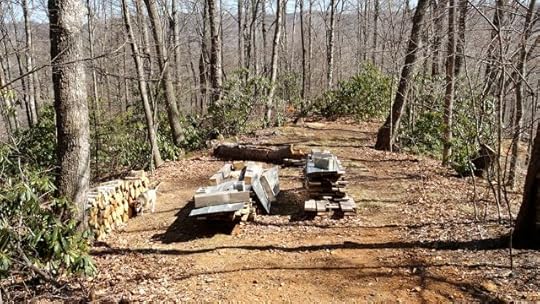
Part of the impetus for getting this work done now is that I'll be taking off for the first leg of my book tour in three weeks, which also coincides with teaching at Interlochen and attending two weddings. I think my amazing book tour manager has something like 15 events planned for me already, which are currently linked on the left sidebar of this blog. (Anyone know of a good calendar widgit? I'm running out of sidebar space.) If the branches get overgrown or the water bars clog, I won't be here to fix them. My parents can check in, but they won't always be here either.
I've done plenty of public readings before, but never so many in such a short period of time and certainly not any that involved the actual sale of a real, published book (!!!). It's an exciting time...but I have to be careful to balance that excitement with practicality. To give a good public reading, I have to be in a certain kind of "space," as they say. I need to be confident yet tender, present yet anticipatory. For me this means a few practical, essential things: dress nicely but feel comfortable in your attire, arrive early but not early enough to get nervous, say "thank you" and remember to smile, connect with the audience through eye contact and very brief anecdotes about the work.
But to sustain this over a period of months, more is in order. As I'm creating space on the land around the Airstream, I need to create space in my psyche (and also my schedule!) so that I can be my best self for the public readings. I've never done a book tour before, but something tells me that to repeatedly be in front of an audience and be 200% present and 200% vulnerable and expressive could take a lot out of a person. Hopefully it will also be fulfilling…In the meantime, I plan on clearing mental space by meditating more frequently, reading books (which is relaxing), and spending time outdoors. At times that feels lavish or selfish. Other times, I know I won't be able fit these things in. But for the most part, my gut tells me that attending to these details right now will pay off when I hit the road (again).
I can read slow enough. I can enunciate. I can drink water without dribbling at the podium and I can create Facebook event invites and look up bookstore locations on Google Maps. It's that deeper, quieter work I'm talking about here. The kind that creates space. Just as clearing the branches will let my little grass seedlings grow, so too clearing a mental space will let my best self grow. In the end, that should make a few moments here and there better for everyone, right? I like to think so.
Published on May 23, 2013 05:00
May 20, 2013
Deciding What to Read
If you missed last week's radio interview on 880 The Revolution, you can
I've been having the most difficult time deciding what to read at my upcoming local book events. Before this year, I never struggled very much. I knew I could read 2-3 flash fiction pieces to start, then a short story, and be done. This was an easy way to offer audience members a sampling of my work.
But this Jan/Feb when I was at Randolph College, the decision plagued me. I was given 60 minutes to read--the longest chunk of time I've ever had at the podium. Author and mentor Bunny Goodjohn gave me sage advice, suggesting that I break up the time into three sections with a little talking in between. That felt perfect for Randolph, as I was there on a faculty fellowship to complete new writing--so I felt both obligated and honored to read new work to my audience. The three segments let me get comfy with polished work to start, and end with new/unrevised work I'd written while at Randolph.
With my book launch one week away, I can't put off the decision any longer. After hemming and hawing all weekend, I finally realized what's causing me such strife:
I can't, and I've had to remind myself that public readings aren't meant to be perfectly rendered for each audience, because the perfect rending doesn't exist. There's no way that I can "reach" every audience member. There's not a chance I can read "the perfect story" for each person sitting in front of me. The group is simply too varied and diverse, and that's probably a good thing anyway.
So I've got to find a balance: the timing has to be right (usually 40 minutes) and it's important to me to represent a variety of perspectives when reading from Flashes of War, since that is so much of what the collection is about. That nails down two things to consider. The other priority is audience connection or engagement--in other words, I've got to offer enough of myself between stories to help audience members connect with the work.
For some stories, that means offering only silence before and after I read the piece. For others, it involves an anecdote or joke or personal touch revealed before the story begins, so that readers--who have come to see and support me, after all--feel like they're "in on" what's being shared. It's this last thing I start to fumble over, feeling uncertainly exactly which of the many audience needs I want to pay allegiance to by reading one story over another.
I've timed my fave flash fiction pieces in the book, as well as the full length stories. Now it's time to move the puzzle pieces around and envision a tall, confident, me standing at the podium in front of what will probably be one of the kindest audiences I'll ever have. All those flashing lights and whistling trains in my anxious brain will have to be muffled, because I've got to come out swinging. No ifs, ands, or buts about it. You only get a first book launch once in your life. Here goes everything...
I've been having the most difficult time deciding what to read at my upcoming local book events. Before this year, I never struggled very much. I knew I could read 2-3 flash fiction pieces to start, then a short story, and be done. This was an easy way to offer audience members a sampling of my work.
But this Jan/Feb when I was at Randolph College, the decision plagued me. I was given 60 minutes to read--the longest chunk of time I've ever had at the podium. Author and mentor Bunny Goodjohn gave me sage advice, suggesting that I break up the time into three sections with a little talking in between. That felt perfect for Randolph, as I was there on a faculty fellowship to complete new writing--so I felt both obligated and honored to read new work to my audience. The three segments let me get comfy with polished work to start, and end with new/unrevised work I'd written while at Randolph.
With my book launch one week away, I can't put off the decision any longer. After hemming and hawing all weekend, I finally realized what's causing me such strife:
I can't, and I've had to remind myself that public readings aren't meant to be perfectly rendered for each audience, because the perfect rending doesn't exist. There's no way that I can "reach" every audience member. There's not a chance I can read "the perfect story" for each person sitting in front of me. The group is simply too varied and diverse, and that's probably a good thing anyway.
So I've got to find a balance: the timing has to be right (usually 40 minutes) and it's important to me to represent a variety of perspectives when reading from Flashes of War, since that is so much of what the collection is about. That nails down two things to consider. The other priority is audience connection or engagement--in other words, I've got to offer enough of myself between stories to help audience members connect with the work.
For some stories, that means offering only silence before and after I read the piece. For others, it involves an anecdote or joke or personal touch revealed before the story begins, so that readers--who have come to see and support me, after all--feel like they're "in on" what's being shared. It's this last thing I start to fumble over, feeling uncertainly exactly which of the many audience needs I want to pay allegiance to by reading one story over another.
I've timed my fave flash fiction pieces in the book, as well as the full length stories. Now it's time to move the puzzle pieces around and envision a tall, confident, me standing at the podium in front of what will probably be one of the kindest audiences I'll ever have. All those flashing lights and whistling trains in my anxious brain will have to be muffled, because I've got to come out swinging. No ifs, ands, or buts about it. You only get a first book launch once in your life. Here goes everything...
Published on May 20, 2013 05:00
May 16, 2013
The Marvel of Seasons
Another book review came in for Flashes of War, this one from Vestal Review Magazine--the oldest flash fiction literary publication in the world. Check out what they had to say right here.

It finally happened. I lost my view of Winter Star, Gibbs, and Horse Rock Mountains. It's the surest sign that spring is officially, finally here. Of course, if I step outside the Airstream and crane my neck, angling my line of sight through the dense forest, I can make out sections of the ridgeline. By way of comparison, here's the same view a month ago. This pre-leaf view shows the ridgeline in the clouds, but still...you get the point:

Growing up in Portland, Oregon, we used to joke that we didn't have seasons. It was rainy and cold or it was rainy and warm. Sometimes, there was this thing called sunshine, and we all loved it very much. But it was a love-hate relationship, in a way, because the sun never gave us all we felt we deserved, despite that we admired it for lifetimes from afar. Of course, Portland does have seasons (and they're much more pronounced than two decades ago, a la global warming), but the point is that I was surrounded by evergreens and, on a larger scale, living not too darn far from a rain forest. Things were wet and dripping and full of life all the time.
I do remember a few trees with leaves that changed colors and fell off--the Japanese Maple in our front yard that was a gift from one of Mom's students; the birch-lined (?) fancier streets downtown. These trees were sort of funky, but they never captured my attention the way the deciduous trees en masse do here. Here's some proof I found from Pacific Northwest Photography's blog. See? Even when it was "sunny" it was still cloudy and no, that is not any kind of photoshopped green:
 By and large, my Portland childhood was all variants of green and signs of life and health were equivalent with the feeling of full, full, full. Views didn't change from season to season and therefore I didn't orient my life, schedule, or even my daily observations around what changed. I oriented by what stayed the same and I always will...which is why, despite having lived in Appalachia for over 11 years, I am still startled when Winter Star, Gibbs, and Horse Rock--those things that are ancient and massive and dark and can never move--suddenly seem to have moved entirely some place else.
By and large, my Portland childhood was all variants of green and signs of life and health were equivalent with the feeling of full, full, full. Views didn't change from season to season and therefore I didn't orient my life, schedule, or even my daily observations around what changed. I oriented by what stayed the same and I always will...which is why, despite having lived in Appalachia for over 11 years, I am still startled when Winter Star, Gibbs, and Horse Rock--those things that are ancient and massive and dark and can never move--suddenly seem to have moved entirely some place else.
Where did they go? I hike to find them again and again, miles under my boots like so many childhood memories.

It finally happened. I lost my view of Winter Star, Gibbs, and Horse Rock Mountains. It's the surest sign that spring is officially, finally here. Of course, if I step outside the Airstream and crane my neck, angling my line of sight through the dense forest, I can make out sections of the ridgeline. By way of comparison, here's the same view a month ago. This pre-leaf view shows the ridgeline in the clouds, but still...you get the point:

Growing up in Portland, Oregon, we used to joke that we didn't have seasons. It was rainy and cold or it was rainy and warm. Sometimes, there was this thing called sunshine, and we all loved it very much. But it was a love-hate relationship, in a way, because the sun never gave us all we felt we deserved, despite that we admired it for lifetimes from afar. Of course, Portland does have seasons (and they're much more pronounced than two decades ago, a la global warming), but the point is that I was surrounded by evergreens and, on a larger scale, living not too darn far from a rain forest. Things were wet and dripping and full of life all the time.
I do remember a few trees with leaves that changed colors and fell off--the Japanese Maple in our front yard that was a gift from one of Mom's students; the birch-lined (?) fancier streets downtown. These trees were sort of funky, but they never captured my attention the way the deciduous trees en masse do here. Here's some proof I found from Pacific Northwest Photography's blog. See? Even when it was "sunny" it was still cloudy and no, that is not any kind of photoshopped green:
 By and large, my Portland childhood was all variants of green and signs of life and health were equivalent with the feeling of full, full, full. Views didn't change from season to season and therefore I didn't orient my life, schedule, or even my daily observations around what changed. I oriented by what stayed the same and I always will...which is why, despite having lived in Appalachia for over 11 years, I am still startled when Winter Star, Gibbs, and Horse Rock--those things that are ancient and massive and dark and can never move--suddenly seem to have moved entirely some place else.
By and large, my Portland childhood was all variants of green and signs of life and health were equivalent with the feeling of full, full, full. Views didn't change from season to season and therefore I didn't orient my life, schedule, or even my daily observations around what changed. I oriented by what stayed the same and I always will...which is why, despite having lived in Appalachia for over 11 years, I am still startled when Winter Star, Gibbs, and Horse Rock--those things that are ancient and massive and dark and can never move--suddenly seem to have moved entirely some place else.Where did they go? I hike to find them again and again, miles under my boots like so many childhood memories.
Published on May 16, 2013 05:00
May 13, 2013
Josh Ritter at The Orange Peel
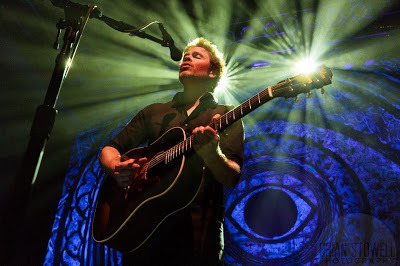 I drove across the country with his music, pure poetic lyrics ringing through my Volvo speakers all the way from Imnaha Canyon, up and over the Continental Divide, onward toward the lowlands of Lake Country in northern Michigan, and eventually homeward bound into the heart of Appalachia.
I drove across the country with his music, pure poetic lyrics ringing through my Volvo speakers all the way from Imnaha Canyon, up and over the Continental Divide, onward toward the lowlands of Lake Country in northern Michigan, and eventually homeward bound into the heart of Appalachia. I borrowed his wisdom for mixed CD's made for three, good men over the course of two, hard years: the one in the Wallowas, another in Alaska, and another still who lived "way back in the cut" of these mountain hollers. For the first, I thought a song might bring him back to me. For the second, I thought a song might make him hold on. And for the third, the song worked--the man waited and waited for me, though our final note was not as harmonious as the song itself.
I even covered a few of his songs when I felt brave at an open-mic night for a celebration in Celo, an impromptu backyard campfire in Milwaukee, and hidden away in a lake cabin in the middle of a 6-million acre park in the Adirondack Mountains of New York.
But mostly, the music of Josh Ritter is something I sought solace in privately over the past 11 years. Lyrically, he is the finest contemporary, American folk rock writer since Bob Dylan and Dave Carter. Musically, he has explored everything from Travis-style fingerpicking to punctuated, syllabic, downstrokes on an electric guitar. Vocally, he's sung in barely a whisper and shouted his despair. He's gone solo and backup band, free (I was there, Music Millennium on NW 23rd, before it closed down, you remember the time) and high priced, tattered t-shirts and pressed collars. He's even crossed into fiction, publishing his first novel, Bright's Passage, through The Dial Press.
Tonight, I get the best of the best. I get to see one of my favorite musicians live, and I get to do it all by myself. Of course, there will be another 1000 people standing in front of the stage at The Orange Peel, and this being a sparsely populated area I'm likely to stumble into someone I know...but as soon as those lights drop, as soon as that first string is plucked, as soon as that voice comes at me live for the fourth (fifth?) time in seven years, I will have arrived at exactly the moment I've been anticipating:
A concert. Alone. The anonymity of darkness. The hush of bodies and the hopeful heartbreak of faces, only faces, upturned to the stage light like so many babies looking out of their cribs. Sound melodramatic? Perhaps, but consider this: we're all reaching for the same thing and very few of us have the same way of getting there. When we find someone who speaks in that direction--through literature, through painting, through music, you name it--we're back to our most innocent selves again, angling toward the light.
Note: I've decided to bring a copy of my book, Flashes of War, signed to him in appreciation of a few songs in particular. I don't want to be perceived as a groupie, but I sincerely hope I can get someone to deliver the book backstage before the show. Like myself, Josh Ritter writes about war, repeats thematic imagery, understands image-as-metaphor through verbs (even if he doesn't know it), and pushes for something deeper through narrative devices. I'd like to talk shop about these things, and in a small way I hope that sharing the book might open a door.
Published on May 13, 2013 05:00

